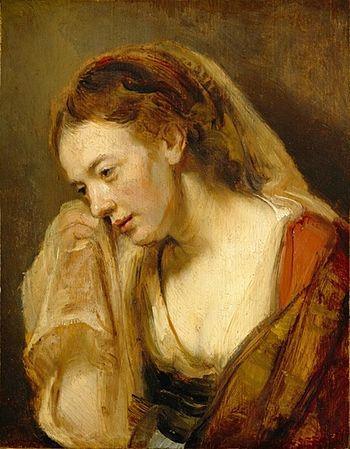Description
Rembrandt's painting "A Weeping Woman" is a masterpiece that has captivated art lovers for centuries. This work is a perfect example of the Baroque artistic style, characterized by its drama and its emphasis on emotion.
The composition of the painting is impressive. The woman is sitting on a chair, her head bowed down and her hands covering her face. The light that enters through the window illuminates her face and her dress, creating a contrast effect that highlights the sadness of the scene.
Color also plays an important role in this work. The woman's dress is dark, which contrasts with the light background and the light coming through the window. This contrast creates a sense of depth and realism in the painting.
The story behind this work is fascinating. The woman in the painting is believed to be Saskia van Uylenburgh, Rembrandt's wife. Saskia died at the age of 29, and this painting is believed to have been created shortly after her death. The sadness and pain that are reflected in the work are a sign of the deep love that Rembrandt felt for his wife.
In addition to its beauty and moving story, "A Woman Crying" also has some little-known aspects. For example, Rembrandt is believed to have used a technique called "impasto" to create the texture of the painting. This technique consists of applying the paint thickly and with texture, which creates a three-dimensional effect in the work.
In conclusion, Rembrandt's "A Weeping Woman" is an impressive work of art that combines the Baroque style with impressive composition and color. The story behind the painting and the technical aspects that went into creating it make it a unique and fascinating work that continues to captivate art lovers around the world.

